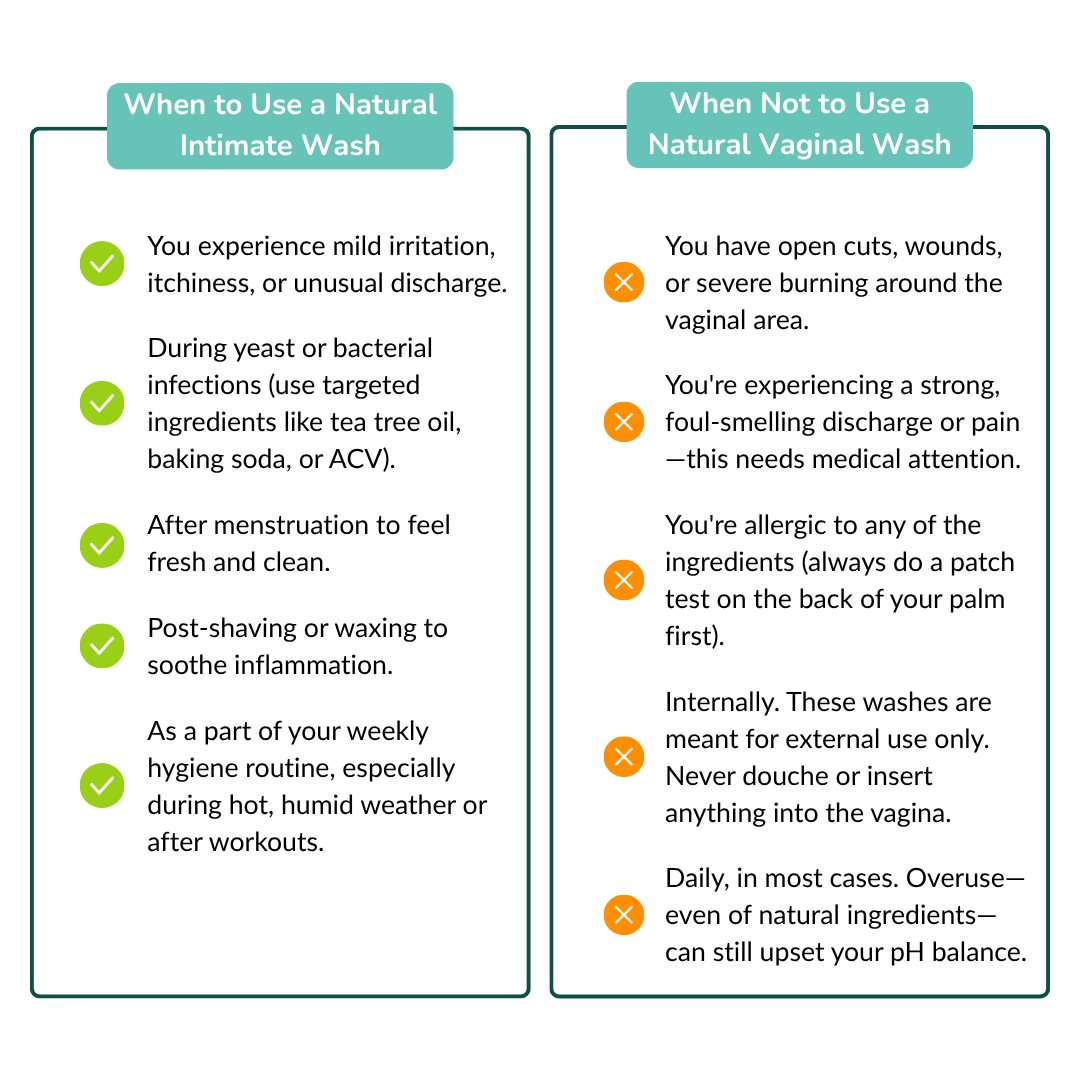Feminine hygiene is often misunderstood. Many women turn to harsh soaps, commercial intimate washes, or even fragrant sprays, thinking they’re keeping themselves clean. But these can do more harm than good.
The vagina is a self-cleaning organ with its own built-in intelligence—just like our nose releases mucus or our skin sweats to cleanse, vaginal discharge is its natural way of flushing out bacteria and toxins.
That’s why using chemical-laden products, vaginal douching solutions, or heavily perfumed soaps can throw off the natural balance. A simple rinse with clean water is usually enough. But for those looking to take their hygiene a step further, using gentler, more natural options, a natural intimate wash made with safe, at-home ingredients may be the answer.
Understanding Vaginal pH and Why It Matters
The vagina maintains a delicate pH level between 3.8 and 4.5—slightly acidic. This natural acidity helps keep harmful bacteria, yeast, and infections at bay. When this pH is disturbed—by using soaps, synthetic vaginal washes, or even antibiotics—it creates an environment where bad bacteria thrive. The result? More UTIs, yeast infections, irritation, or unusual discharge.
Maintaining this natural pH is key to supporting vaginal health. That’s why anything you use externally must respect and protect this acidic environment, not disrupt it.
Benefits of DIY Natural Intimate Washes
Using a natural vaginal wash or natural intimate wash made at home with simple, gentle ingredients offers several benefits:
Maintains pH Balance:
Natural ingredients like rose water or an apple cider vinegar feminine wash recipe (made with the mother culture) help support the vagina’s natural pH without disrupting it.
Avoids Harsh Chemicals:
DIY washes are free of sulfates, parabens, and synthetic fragrances that often irritate sensitive skin.
Antimicrobial & Antifungal Properties:
Ingredients like tea tree oil, neem, and calendula are known to fight off unwanted bacteria and fungi.
Soothing & Anti-inflammatory:
Aloe vera, chamomile, and lavender help reduce irritation, redness, or itchiness, especially during infections or hormonal shifts.
Cost-effective & Customizable:
You know exactly what’s going into your wash, and you can adjust ingredients based on your body’s needs or sensitivities.
When made and used correctly, natural washes can support hygiene without interfering with the vagina’s natural intelligence.
Natural Ingredients & DIY Methods That Actually Work
When it comes to choosing a natural intimate wash or natural vaginal wash, the power lies in simple, everyday ingredients that are gentle, effective, and pH-respecting. Normal shower water will maintain the right balance of bacteria and keep you clean. However, if you want to take your hygiene routine a step further, then here are some D.I.Y natural vaginal washes.
1. Apple Cider Vinegar (ACV) Sitz Bath
Why: ACV has antibacterial and antifungal properties that help restore pH balance, especially during vaginal infections like vaginitis.
How:
- Add ¼ cup of organic apple cider vinegar (with the mother culture) to a small sitz bath or tub of warm water..
- Sit in it for 15–20 minutes.
- Rinse the groin area with lukewarm water and pat dry.
- Can be done twice daily during discomfort.
This works as a natural intimate wash that supports the vagina’s recovery process—and is one of the most widely used apple cider vinegar feminine wash recipes.
2. Baking Soda Sitz Bath
Why: Helps neutralize odor and soothe yeast infections.
How:
- Add 1 tablespoon of baking soda to a tub of warm water.
- Stir well until it dissolves.
- Sit for 10–15 minutes.
Recommended for those dealing with recurring yeast infections. Avoid using it daily to prevent pH disruption.
3. Lemon Leaf and Tea Tree Oil Wash
Why: Lemon leaves offer antibacterial benefits, while tea tree oil is a strong antimicrobial that helps with infections.
How:
- Boil 3–4 lemon leaves in 1 cup of water.
- Let it steep for 30 minutes.
- Add 1–2 drops of tea tree oil once cooled.
- Store in a clean glass bottle.
This wash can stay good for up to a month in the refrigerator.
4. Rose Water & Lavender Oil Wash
Why: Rose water cools and soothes sensitive skin, while lavender oil adds a calming, anti-inflammatory effect.
How:
- Mix 1 cup water with 1/3 cup organic rose water, 3–4 drops of rosemary oil, and 3–4 drops of lavender oil.
- Shake well and store in a glass container.
- Use as a refreshing and natural intimate wash.
Lasts for a month when stored in a cool, dry place.
5. Calendula & Virgin Cold-Pressed Coconut Oil Wash
Why: Calendula is known for healing inflammation and irritation, while coconut oil is antimicrobial and deeply moisturizing.
How:
- Mix 1 cup water with 3–4 tbsp virgin cold-pressed coconut oil and 5 drops of calendula oil.
- Slightly warm the mix and store it in a clean glass bottle.
- Use externally as a soothing natural vaginal wash, especially during dry or irritated phases.
Shelf life: 3–4 months.
6. Chamomile & Frankincense Oil Wash
Why: Chamomile calms inflammation; frankincense supports skin healing and reduces discomfort.
How:
- Boil 1 chamomile tea bag in 1 cup of water and let steep for 30 minutes.
- Add 3 tbsp almond oil and 4 drops of frankincense oil.
- Mix well and store in a glass container.
Use externally as needed. It stays fresh for up to a month.
Note: Always use boiled and cooled water to make any natural intimate wash. These are for external use only—never insert them inside the vagina.
When to Use and When Not To
 Frequently Asked Questions (FAQs)
Frequently Asked Questions (FAQs)
1. Can I use a natural intimate wash every day?
No. Even a natural vaginal wash can disturb your vaginal pH if used too often. 2–3 times a week is enough unless you’re dealing with an active infection.
2. Is a natural vaginal wash safe for sensitive skin?
Yes—most are gentler than commercial washes. But always do a patch test. If your skin reacts, stop using it immediately.
3. Can I use these washes during my period?
Yes, but it’s not necessary. The vagina naturally cleans itself during menstruation. If you want to feel fresh, rinse with plain water or a very diluted natural vaginal wash.
4. Will these washes treat infections like UTIs or yeast overgrowth?
They may help relieve mild symptoms or prevent infections, but they’re not a cure. For ongoing issues, see a doctor.
5. Can pregnant women use a natural intimate wash?
Some ingredients, like tea tree oil or essential oils, should be avoided during pregnancy. Always consult your doctor before using any DIY vaginal wash.
6. What’s the best time to use a natural vaginal wash?
After exercise, intercourse, periods, or when feeling itchy or uncomfortable. Avoid using it right after shaving unless the ingredients are soothing (like aloe or chamomile).
7. Do I need to refrigerate homemade natural vaginal wash?
Yes, especially if the wash contains water and no preservatives. Store it in a clean glass bottle in the fridge and always check for changes in smell or color before use.
8. Can I use these washes internally?
No. A natural intimate wash is for external use only. The vagina cleans itself internally and inserting any wash—even natural—can do more harm than good.
9. Can men use a natural intimate wash too?
Yes. While formulated for vaginal health, these gentle washes can be used externally by men for intimate hygiene.
10. Are these washes better than commercial products?
In most cases, yes. A natural vaginal wash avoids harsh chemicals, artificial fragrances, and preservatives that can irritate the skin or disrupt pH.
Final Thoughts
Your vagina is self-cleaning and intelligent. It doesn’t need fancy soaps, artificial fragrances, or aggressive cleaning routines. Most of those do more harm than good. What it needs is support, not interference.
A natural vaginal wash made with simple, safe ingredients can be a gentle way to maintain hygiene without disturbing your body’s natural pH. Ingredients like baking soda, neem, rose water, and tea tree oil—or a trusted apple cider vinegar feminine wash recipe—can help manage mild irritation, discharge, or occasional infections when used externally. But they’re not miracle cures or replacements for medical advice when something’s clearly off.
Use a natural intimate wash mindfully—2 to 3 times a week is usually enough. Over-washing, even with natural formulas, can disrupt the vaginal flora. Always store your DIY washes in clean glass containers, preferably refrigerated, and check for signs of spoilage.
Also, remember, if you’re experiencing persistent pain, unusual discharge, or strong odor, it’s a sign that you need to consult a healthcare professional, not just rely on home remedies.
Finally, less is more. Plain water is often enough. But when you do want a little extra care, stick to trusted, simple recipes with natural ingredients that work with your body, not against it.
The goal isn’t to mask your natural scent or chase some unrealistic idea of “freshness.” It’s to support your body in doing what it already does best: protect, clean, and heal itself. And when you approach hygiene this way, your intimate care becomes just that—care, not control.
Disclaimer: The information provided here is not intended to replace the medical advice from your doctor. Always consult your doctor and keep them informed if you plan to try anything new.
Also read – Keeping Your Vagina Clean And Healthy
Ready to Make Your Health a Priority?
Start your journey with one positive action today.
Check Out Our Wellness Program.
Looking for personalized advice? Our experts are ready to help you thrive.
Reach Out to Team Luke’s Integrative Health Coaches!
Book a one-on-one with our team. Call: 1800 102 0253 or write to us at consults@lukecoutinho.com.

Team Luke
Start Your Wellness Journey
Feeling inspired to take the next step in your wellness journey? Connect with us to explore how our tailored programs can support your health journey. Your transformation is just a conversation away.


 Frequently Asked Questions (FAQs)
Frequently Asked Questions (FAQs)

